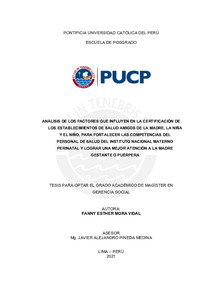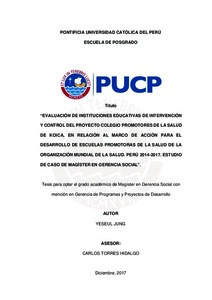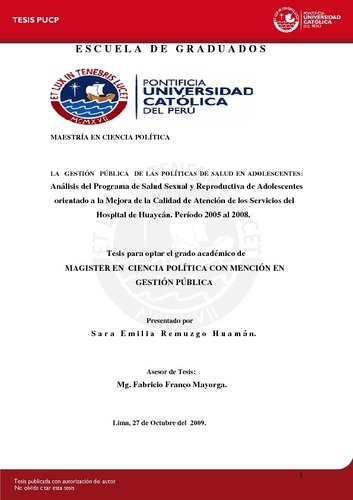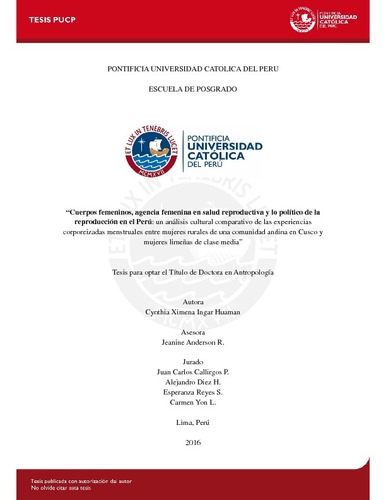| dc.contributor.advisor | Pineda Medina, Javier Alejandro | |
| dc.contributor.author | Mora Vidal, Fanny Esther | |
| dc.date.accessioned | 2022-01-15T04:57:17Z | |
| dc.date.available | 2022-01-15T04:57:17Z | |
| dc.date.created | 2021 | |
| dc.date.issued | 2022-01-14 | |
| dc.identifier.uri | http://hdl.handle.net/20.500.12404/21296 | |
| dc.description.abstract | The Baby-Friendly Hospital Initiative (BFHI) is a global strategy for the promotion,
protection and support of breastfeeding, which arose in 1991 from the joint effort
of UNICEF / WHO following the recommendations of the Declaration of Innocenti
(1989) and the "Ten Steps to successful Breastfeeding." Peru adopted the Initiative
in 1992. In 2014 the Ministry of Health relaunched the initiative: Administration
directive for the Certification of ESAMNN2 that emphasizes the technical-normative
criteria that the initiative lacked in 1992. The National Maternal-Perinatal Institute
(INMP) is recertified in August 2018 as ESAMNN, committing to comply with the
three pillars that make up the certification, the most important being the "10 Steps
for Successful Breastfeeding", where Step 2 "Training of health staff", the basis of
this research, deals with of theoretical-practical training and scientific updating in
breastfeeding, as well as the strengthening of communication skills of health staff
to ensure adequate follow-up care of the mother in breastfeeding and to ensure
the success of her breastfeeding. In this sense, the general purpose of this
research is to know the factors that influence the implementation of the ESAMNN,
to strengthen the capacities of the INMP health staff and achieve better care for
the pregnant or puerperal mother, by analyzing the evolution of their
communication skills as well as the information provided, their practical support,
their experience in breastfeeding, and the treatment they offer, in order to propose
recommendations on the training offered to health staff. The information and
material given in this research provides guidelines for a greater interaction of health
staff with mothers who are users of a health facility, in the field of breastfeeding. | es_ES |
| dc.description.abstract | La Iniciativa Hospital Amigo del Niño (IHAN) es una estrategia mundial de
promoción, protección y apoyo de la lactancia materna (LM), que surge en 1991
del esfuerzo conjunto de UNICEF/OMS acorde a las recomendaciones de la
Declaración de Innocenti (1989) y los “10 Pasos para una Lactancia Feliz”. El Perú
adopta la Iniciativa en 1992. En 2014, el Ministerio de Salud relanza la iniciativa:
Directiva Administrativa para la Certificación de ESAMNN1 que enfatiza los
criterios técnico-normativos que careció la iniciativa en 1992. El Instituto Nacional
Materno Perinatal (INMP) se recertifica en agosto 2018 como ESAMNN,
comprometiéndose a cumplir los tres pilares que componen la certificación, siendo
el más importante los “10 Pasos para una Lactancia Materna Exitosa”, donde el
Paso 2 “Capacitación del personal de salud”, base de la presente investigación,
se ocupa de la formación teórico-práctica y la actualización científica en LM, así
como del fortalecimiento de habilidades de comunicación del personal de salud
para asegurar una atención adecuada de acompañamiento de la madre en LM y
asegurar el éxito de su lactancia. En ese sentido el objetivo general de la presente
investigación plantea: Conocer los factores que influyen en la implementación de
la ESAMNN, para fortalecer las capacidades del personal de salud del INMP y
lograr una mejor atención a la madre gestante o puérpera, analizando el desarrollo
de sus competencias y habilidades de comunicación, así como la información
brindada, el apoyo práctico, la experiencia en LM, y el trato ofrecido por el personal
de salud, para proponer recomendaciones de mejora sobre las capacitaciones
ofrecidas al personal de salud. La información y el material producido en la
presente investigación, aporta pautas para una mayor interacción del personal de
salud con las madres usuarias de un establecimiento de salud, en el ámbito de la
LM. | es_ES |
| dc.language.iso | spa | es_ES |
| dc.publisher | Pontificia Universidad Católica del Perú | es_ES |
| dc.rights | info:eu-repo/semantics/openAccess | es_ES |
| dc.rights.uri | http://creativecommons.org/licenses/by-sa/2.5/pe/ | * |
| dc.subject | Salud materno infantil--Perú | es_ES |
| dc.subject | Servicios de salud--Perú--Control de calidad | es_ES |
| dc.subject | Personal de salud pública--Capacitación | es_ES |
| dc.title | Análisis de los factores que influyen en la certificación de los establecimientos de salud amigos de la madre, la niña y el niño, para fortalecer las competencias del personal de salud del Instituto Nacional Materno Perinatal y lograr una mejor atención a la madre gestante o puérpera | es_ES |
| dc.type | info:eu-repo/semantics/masterThesis | es_ES |
| thesis.degree.name | Maestro en Gerencia Social | es_ES |
| thesis.degree.level | Maestría | es_ES |
| thesis.degree.grantor | Pontificia Universidad Católica del Perú. Escuela de Posgrado. | es_ES |
| thesis.degree.discipline | Gerencia Social | es_ES |
| renati.advisor.dni | 29654086 | |
| renati.advisor.orcid | https://orcid.org/0000-0002-7060-1384 | es_ES |
| renati.author.dni | 08052853 | |
| renati.discipline | 314127 | es_ES |
| renati.juror | Torres Hidalgo, Carlos | es_ES |
| renati.juror | Pineda Medina, Javier Alejandro | es_ES |
| renati.level | https://purl.org/pe-repo/renati/level#maestro | es_ES |
| renati.type | https://purl.org/pe-repo/renati/type#tesis | es_ES |
| dc.publisher.country | PE | es_ES |
| dc.subject.ocde | https://purl.org/pe-repo/ocde/ford#5.09.00 | es_ES |









